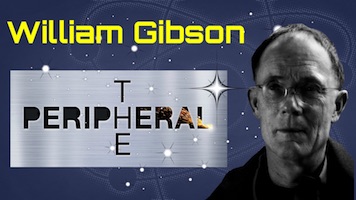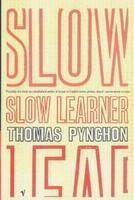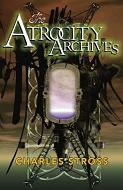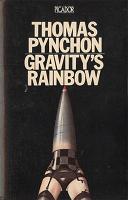 Do I need to introduce William Gibson? Author of Neuromancer (and 12 novels since), winner of about everything which can be won in the field? Yes, he’s moved on from his Cyberpunk days, that’s perfectly ok, and to be expected. And, with The Difference Engine he is/was one of the founding fathers of Steampunk, too. Plus - he’s still putting out utterly compelling material, like the book at hand.
Do I need to introduce William Gibson? Author of Neuromancer (and 12 novels since), winner of about everything which can be won in the field? Yes, he’s moved on from his Cyberpunk days, that’s perfectly ok, and to be expected. And, with The Difference Engine he is/was one of the founding fathers of Steampunk, too. Plus - he’s still putting out utterly compelling material, like the book at hand.
The Peripheral is his latest novel (and yes, I’m behind, it’s been a year since he published this), it’s a standalone novel in a rather interesting setting, inasmuch as this plays in a future world (post-apocalyptic does not really cover it. post-dystopian?) which has learned to make connections to the past - each of which splits of another ‘stub’, creates another time line which started the same as the past, but which branches off from the point of contact. So far so Everett-Wheeler-Graham, I guess…
The story starts with Flynne standing in for her war vet brother, flying a paid shift running security in a game (or that’s what she thinks it is), and witnessing a murder in the process. Playing games for money seems to be one of the main ways of earning a living in Flynne’s world - the other alternative seems to be fabbing (think 3D printing, advanced), mostly counterfeit goods or drugs. But the crime she witnessed was real, and not in a game, and someone wants Flynne dead now, urgently.
In parallel chapters we follow Wilf Netherton as one of his charges tries to contact the denizens (‘Patchers’) of the floating city in the Pacific Garbage Patch to cut some kind of deal - and the whole operation goes badly belly-up. This leaves Wilf initially out of work, and soon thereafter a target for elimination for reasons he is not entirely sure of - something else is afoot, and not just that deal/project having gone wrong and a number of Patchers killed in the process.
And whilst it initially is not clear what the connection is between the two threads which are being told in alternating short chapters it soon becomes clearer how things hang together as the strands start to intertwine - Flynne lives in some kind of alternative near-future, whilst Wilf lives in the actual future (and who considers which time an appropriate ‘present’ is rather interesting!).
The initial chapters felt instantly familiar - the protagonist stereotypes, the deal, the way plans go wrong and trigger off events. I frequently thought “oh, this feels a like character x from story y which is by, oh. wait. Gibson, of course…” Not that it’s all stuff we’ve seen before, or that all the usual players are back as pieces on the playing field, but things felt familiar and comfortable (well, kinda, sometimes) more or less from the start. Nothing wrong with that, of course, not if you’re writing at that kind of clever and entertaining level, I guess.
“They want to kill a dead man in a past that effectively doesn’t exist?”
A few words on the world this plays in (mainly the future/present one) - we get to see very advanced technologies with assemblers being used quite substantially, creatively, and to humanity’s good (in general, at least). They have AIs mining all data for connections (this is a panopticon society, unless you have sufficient money, connections, and influence). Peripherals are artificially created humans (well, human shells) which can either be animated to basic functionality by an AI, or remotely inhabited by someone else, allowing them to be present ‘in the flesh’. Other things, like small Homunculi, and some technological artefacts like robots (and much more) can also be inhabited and controlled by the same remote means. And it’s interesting that this is also possible from the past into the future (they are supplied with the required technology for the neural cut-out).
What separates this world, besides a good number of years, is what is known as the ‘Jackpot’, which is responsible for the changes to the future world, the very limited number of people extant, and for the social structure (it’s a Kleptocracy). The book explains quite late what the Jackpot actually is/was, and whilst it is rather realistic I found I shall not spoil your suspense, or your reading enjoyment here.
One of Wilf’s influential friends has (obviously cloned) Thylacines guarding some of his properties - “Carnivorous Kangaroos, in Wolf outfits, with Cubist stripes” is a description given. A fascinating touch, I felt.
The characters are interesting - not just Flynne (who is strong, very straightforward, and doesn't seem to reflect much, which keeps her going) and Wilf (a professional bullshit artist, manipulator, and compulsive liar with an alcohol problem), but also the rest of the cast of damaged vets, post-modern artists, and behind-scenes-string-pullers are captivating. Gibson still has his knack for naming places in a way that on the one hand feel authentic, but on the other always seems to be one step further leftfield than reality - a classic example from this book is a bar/restaurant/eventspace/immersive installation called ‘Impostor Syndrome’.
I felt that the book itself does not engage as much as some other Gibson stories I’ve read, and some of the key connections and players are introduced quite late, but these are minor niggles in a really rather clever, fascinating, and absorbing story.
More William Gibson
Title: The Peripheral
Author: William Gibson
Reviewer: Markus
Reviewer URL: http://thierstein.net
Publisher: Penguin?Viking
Publisher URL: http://www.penguin.com
Publication Date: 2014
Review Date: 151112
ISBN:9780670921553
Price: UKP 18.99
Pages: 485
Format: Hardback
Topic: Alternate History
Topic: SF













